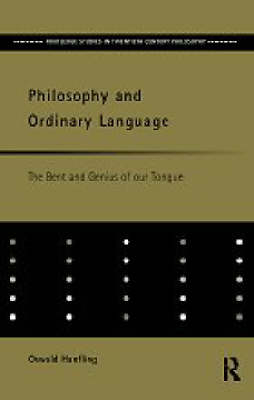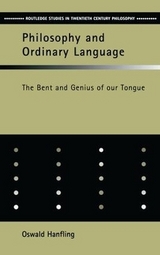
Philosophy and Ordinary Language
The Bent and Genius of our Tongue
Seiten
1999
Routledge (Verlag)
978-0-415-21779-8 (ISBN)
Routledge (Verlag)
978-0-415-21779-8 (ISBN)
- Lieferbar
- Versandkostenfrei
- Auch auf Rechnung
- Artikel merken
Zu diesem Artikel existiert eine Nachauflage
Anyone wishing to gain a better understanding of the philosophy of language, and the nature of ordinary language in philosophy should read this book.
What is philosophy about and what are its methods? Philosophy and Ordinary Language is a defence of the view that philosophy is largely about questions of language, which to a large extent means ordinary language. Some people argue that if philosophy is about ordinary language, then it is necessarily less deep and difficult than it is usually taken to be but Oswald Hanfling shows us that this isn't true.
Hanfling, a leading expert in the development of analytic philosophy, covers a wide range of topics, including scepticism and the definition of knowledge, free will, empiricism, folk psychology, ordinary versus artificial logic, and philosophy versus science. Drawing on philosophers such as Austin, Wittgenstein, and Quine, this book explores the nature of ordinary language in philosophy.
What is philosophy about and what are its methods? Philosophy and Ordinary Language is a defence of the view that philosophy is largely about questions of language, which to a large extent means ordinary language. Some people argue that if philosophy is about ordinary language, then it is necessarily less deep and difficult than it is usually taken to be but Oswald Hanfling shows us that this isn't true.
Hanfling, a leading expert in the development of analytic philosophy, covers a wide range of topics, including scepticism and the definition of knowledge, free will, empiricism, folk psychology, ordinary versus artificial logic, and philosophy versus science. Drawing on philosophers such as Austin, Wittgenstein, and Quine, this book explores the nature of ordinary language in philosophy.
Oswald Hanfling
INTRODUCTION 1.THE PHILOSOPHY OF WHAT WE SAY: ITS PRACTICE AND JUSTIFICATION 1. Socrates and the quest for definitions. 2. Austin: 'at least one philosophical method'. 3. Wittgenstein: bringing words back to their everyday use. 4. 'What we say': who says? 5. What is wrong with the Paradigm Case Argument? 6. Knowledge and the use of 'knowledge'. 7. Philosophical sceptism and 'what we say'. 2.THE PHILOSOPHY OF 'WHAT WE SAY': CHALLENGE AND REJECTION 8. Drawing the curtain of words. 9. Language remade: ancient cities and orderly towns. 10. Grice: 'true even if misleading' 11. Quine and the unity of science. 12. Scientific realism: discovering what we really mean. 13. 'Folk psychology' and the language of science.
| Erscheint lt. Verlag | 16.12.1999 |
|---|---|
| Reihe/Serie | Routledge Studies in Twentieth-Century Philosophy |
| Verlagsort | London |
| Sprache | englisch |
| Maße | 138 x 216 mm |
| Gewicht | 670 g |
| Themenwelt | Geisteswissenschaften ► Geschichte |
| Geisteswissenschaften ► Philosophie ► Erkenntnistheorie / Wissenschaftstheorie | |
| Geisteswissenschaften ► Philosophie ► Philosophie der Neuzeit | |
| Geisteswissenschaften ► Philosophie ► Sprachphilosophie | |
| ISBN-10 | 0-415-21779-2 / 0415217792 |
| ISBN-13 | 978-0-415-21779-8 / 9780415217798 |
| Zustand | Neuware |
| Haben Sie eine Frage zum Produkt? |
Mehr entdecken
aus dem Bereich
aus dem Bereich
die Grundlegung der modernen Philosophie
Buch | Softcover (2023)
C.H.Beck (Verlag)
CHF 25,20
Buch | Softcover (2023)
Reclam, Philipp (Verlag)
CHF 9,80



![Was heißt Denken?. Vorlesung Wintersemester 1951/52. [Was bedeutet das alles?] - Martin Heidegger](/media/113619842)